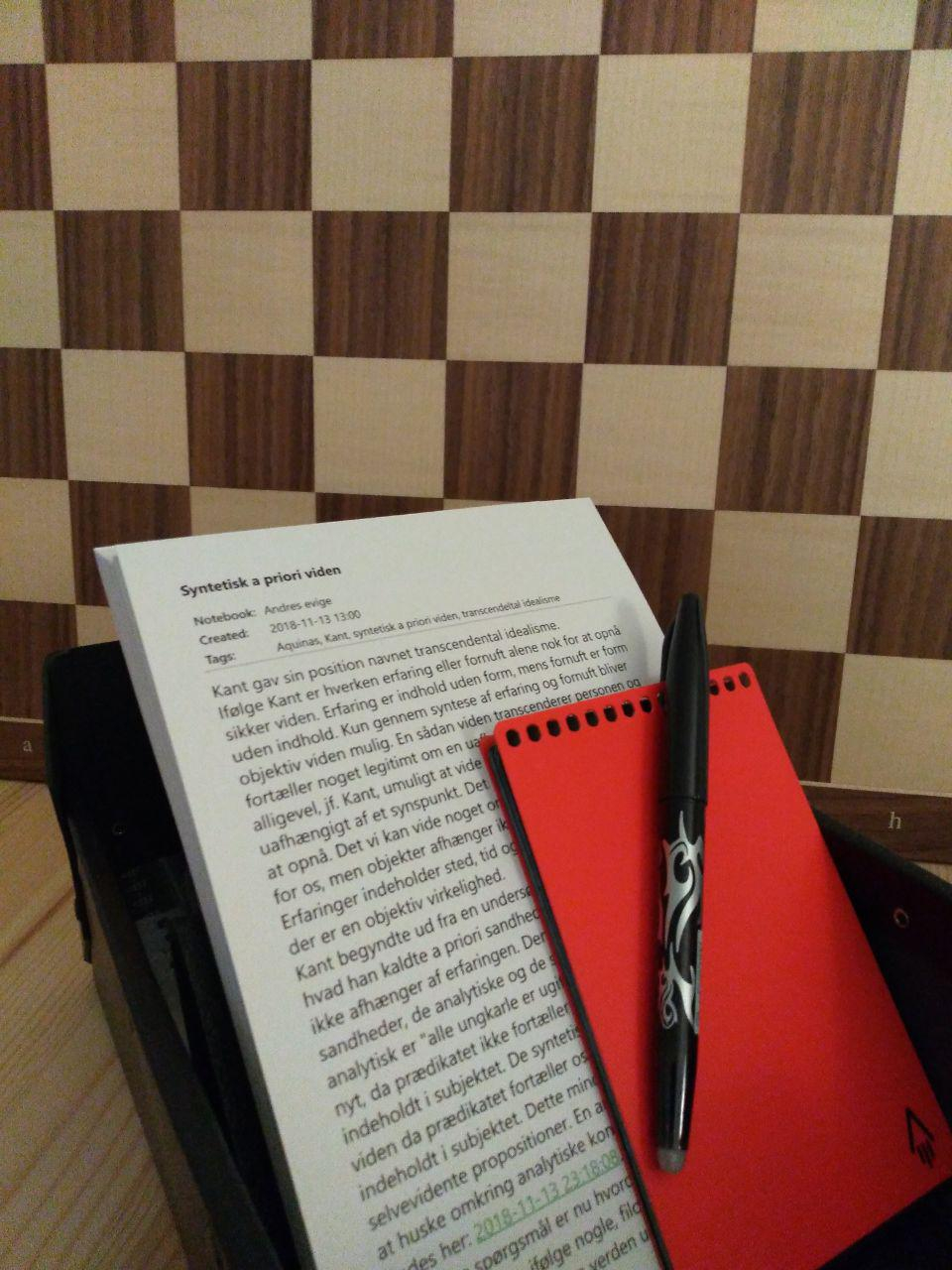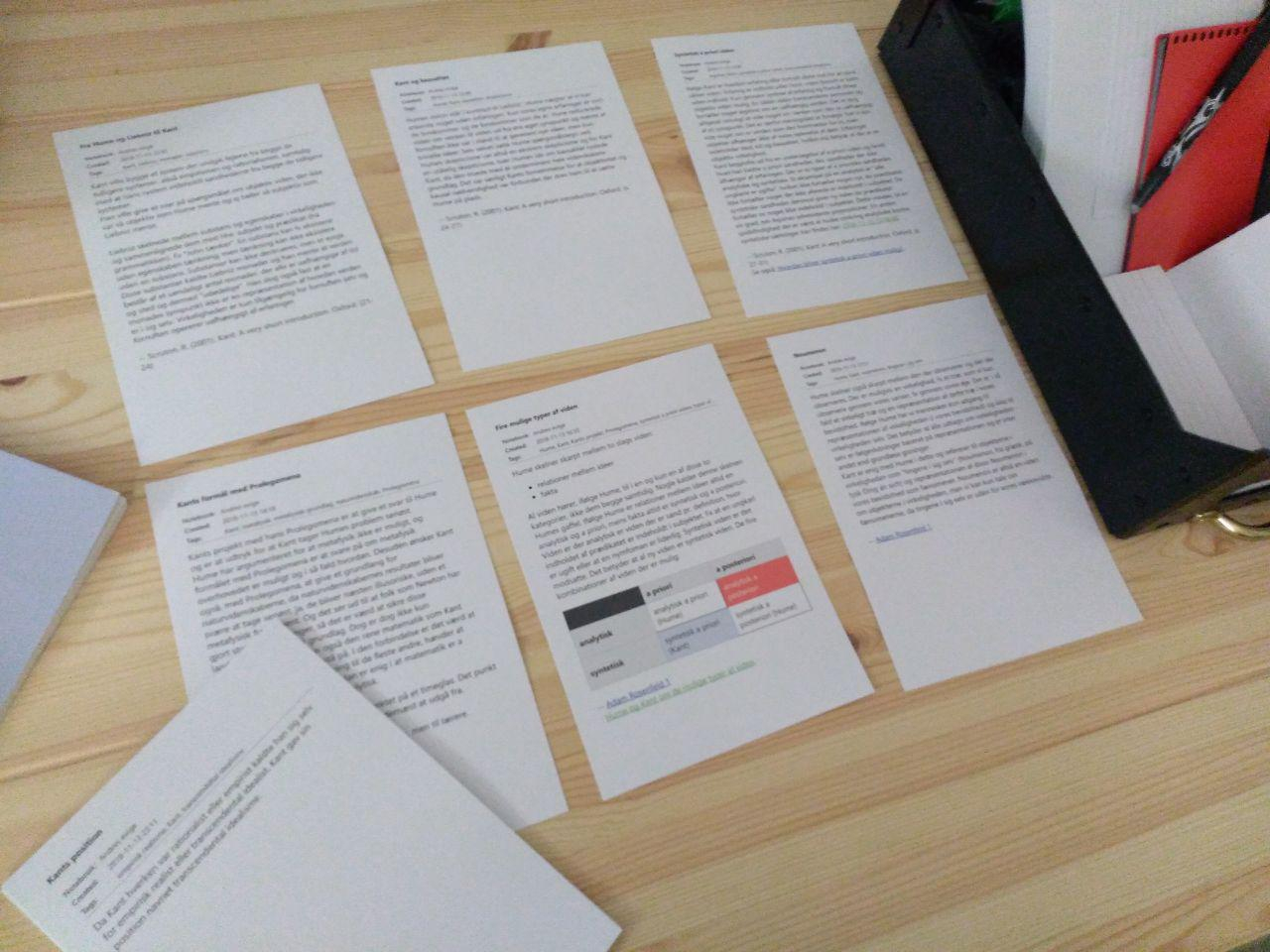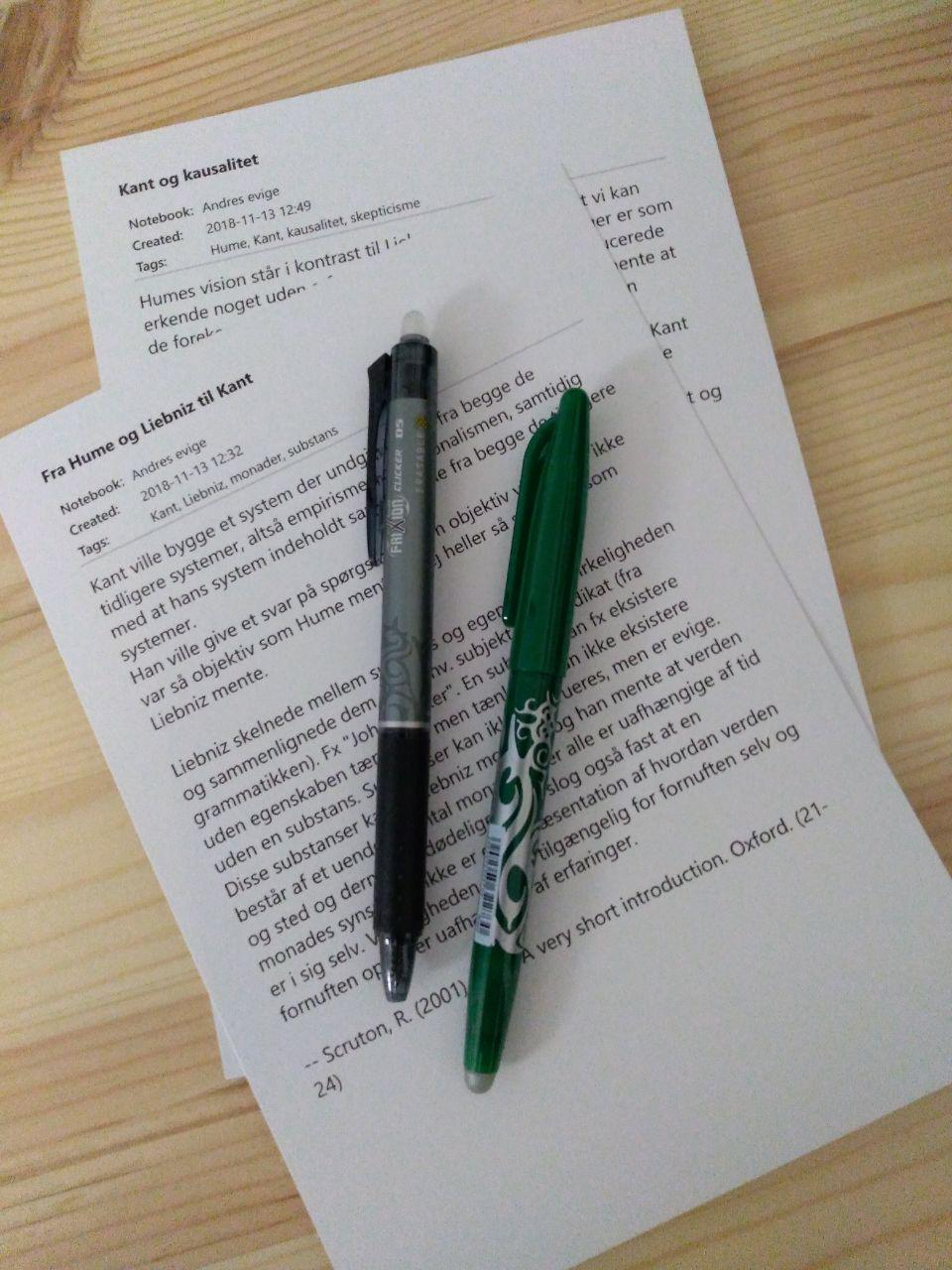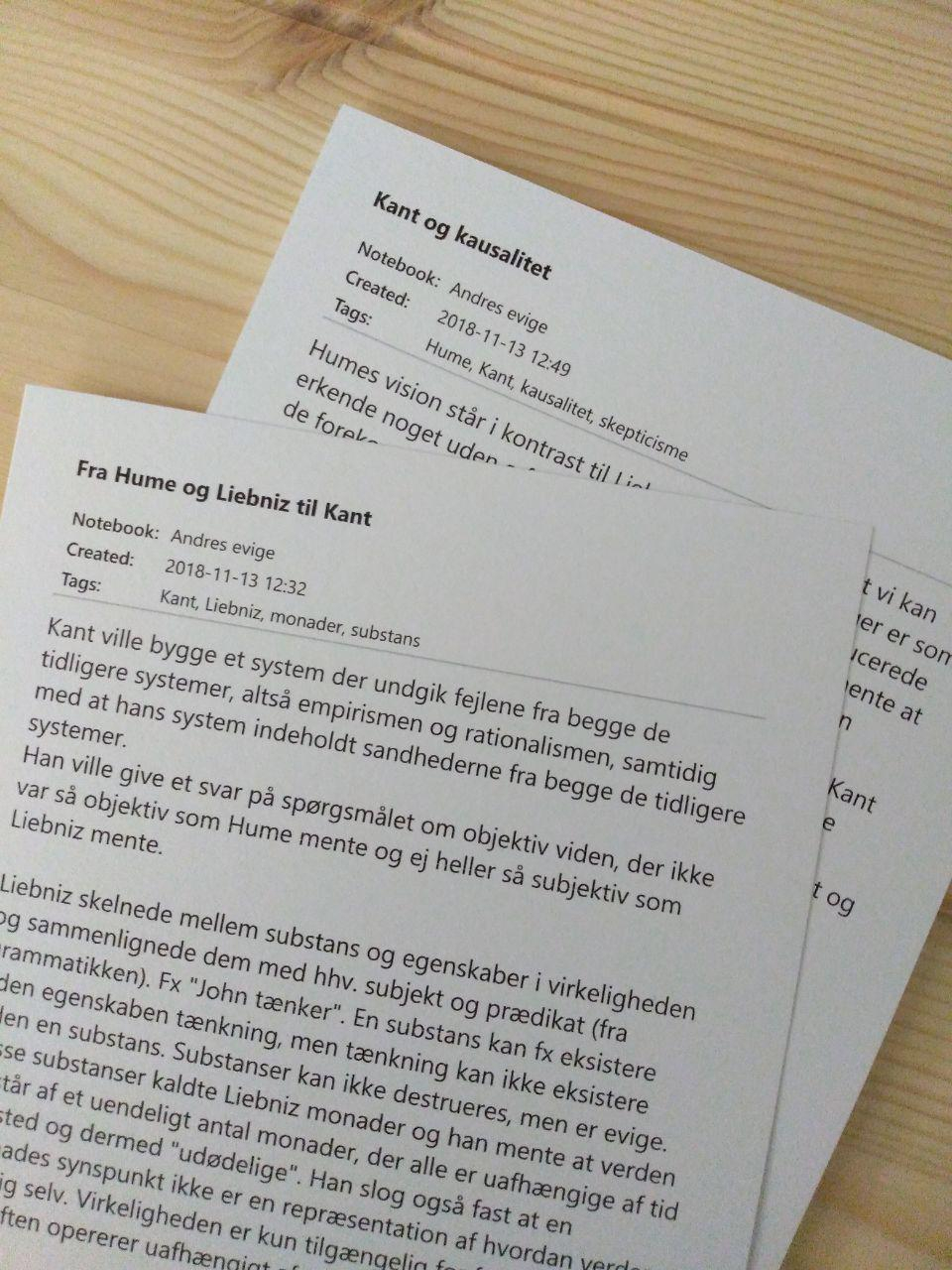The analog/digital Zettelkasten
Weeks of experimentation with the Zettelkasten principles. Now having zettled (yes, I know it is not spelled with a Z) on a setup with a Rocketbook for provisional notes and my eternal notes stored digitally in Evernote and in an analog manner in my card index box. This is dynamite, and I am posting some pictures here since @christian asked me (on Twitter) if I could provide some. I hope this will be of use to others. If you have any questions about my setup, feel free to ask.
The analog Zettelkasten with Rocketbook and pen: 
Close-up: 
Being able to experiment with various narratives by hand is rock'n'roll: 
To give a sense of size: 
All cards have a date stamp for finding them easily: 
Howdy, Stranger!

Comments
Oh! And the digital part of the system, not to forget:
Correction: It was @ctietze who suggested I post the images here. Sorry for the confusion.
Thank you for sharing the pictures! And welcome to the forum!
And welcome to the forum!
I didn't expect you to print things so neatly. That's a surprising twist to a paper-based system, since it takes even longer to create notes. During which step do you create the hand-written notes, like in your tweet?
Author at Zettelkasten.de • https://christiantietze.de/
Thanks @ctietze
Currently, I do this:
1. I record myself reading a chapter of a book.
2. I listen to the recording and take non-permanent notes by hand (without stopping). Now, I take these notes on the pages of my dismantled Rocketbook.
3. I then write my permanent notes into Evernote, based on the handwritten notes. I ensure that the length of each note can fit on an A5-index card (approx. 250 words). I tag these notes and link them together.
Now and then I print the next batch of notes and place them in my black box. This way, it doesn't take longer printing the notes. However, having the notes printed on cardboard paper is amazing when it is time to write. I can spread them on the table, or on the floor if needed, to get an overview and experiment with various linear narratives.
This is an incredible amount of diligence! Question for @ctietze or anyone else : how do you use the archive to manually "spread" the notes like @StefanHansen talks about here? Is it only the search and clicking on tags? I do confess having the ability to spread them out physically seems to spur my thinking to whole new levels. Thanks!
@newzettelkid
Diligence: perhaps. Time-saving in the long run: certainly.
I tend to measure everything, and this is the least time-consuming process I've found so far. I read aloud at a rate of about 16 pages an hour. Listening (while taking handwritten notes), obviously, takes the same amount of time. Transforming my handwritten notes to permanent notes takes, coincidentally, also about one hour for the 16 pages and then I end up with 6-10 notes, each approx. 200 words on average.
So, in total it is 3 hours of work for writing the equivalent of 4 pages (on 6-10 index cards) of notes for 16 pages of source material. In other words: 4 pages of notes ready to string together with other notes for a draft later, as a result of 3 hours of work.
PS The source material is currently Kant and Hegel.
Thank you @StefanHansen , that's super helpful. So you generate endlessly reusable notes at the rate of 1 1/3 pages per hour of focused work. Pretty impressive. One last question - why read aloud rather than take notes side by side as you read (which is what I am starting with, being new to ZK). Many thanks!
Glad you find it useful, @newzettelkid
I read aloud for a couple of reasons. Firstly, to expose myself to the same material via more than one modality, since there is research indicating this improves comprehension and remembrance. 2) Secondly, it helps to free myself from the words of the author and express things in my own words. 3) Thirdly, since I do not stop while listening, I am not constantly "pulled out of the narrative" as we are when taking notes while reading, going back and forth between source text and own notes. I sense that my notes become more generative this way,
For more on generative vs. non-generative notetaking see: Mueller, P. A. (2014). The pen is mightier than the keyboard.
@StefanHansen thank you for the detailed response. Yes, makes total sense, and has tipped the scales for me in favor of trying it out myself. But I suspect only for the serious texts. I also read a fair bit of "popular" nonfiction for lack of a better term - they have some content but not as intense as , say a textbook on the subject. I think that would be a good trade-off and would like to hear your thoughts if they differ from this view. Thanks again! I have learned much from this discussion.
@newzettelkid - can you explain what you mean by tradeoff in this context? Otherwise, I am not sure how to respond.
Thanks for sharing your workflow @StefanHansen . Very interesting using various modes to digest the information. It’s a process I Kant ignore.
@StefanHansen , my apologies. I meant to say use the dictation and playback method for more serious and dense material and stick to the paper note taking method for lighter texts. Otherwise I would not have time given the breadth of topics i need to learn for my objective, thanks again for the helpful comments
@newzettelkid - I see. If you just want the gist of a text, then I agree that scanning it (not reading) and taking handwritten notes is fine. Alternatively, an in some cases better, you can try taking notes while listening to an audiobook version the material. That saves you the time it takes to record your own voice and still gives you some of the other benefits mentioned above.
@JohnAtl - I agree, and we Kant ignore Kant either.
@StefanHansen have you tried speeding up playback to, say, x1.25? After a brief adjustment phase of a couple of minutes (practice on YouTube ) you should be able to follow along as if it was on normal speed. Question is: is this too fast for your transcription process?
) you should be able to follow along as if it was on normal speed. Question is: is this too fast for your transcription process?
Author at Zettelkasten.de • https://christiantietze.de/
@ctietze - It depends on the material and the depth of understanding one is aiming for. I have tried this on YouTube, and sure, it is possible to follow along, but I am not aiming at getting the gist of something, but for understanding it well. LibriVox has a ton of great (free) audiobooks. Try listening to the recording of Hegel's Phenomenology of Mind. Even at normal speed, it isn't possible (for me) to get a thorough understanding of it.
Surely not, but re-hearsing a recording of your own audio notes should work quite well.
Author at Zettelkasten.de • https://christiantietze.de/
I appreciate the suggestions. It might be a hack for some. Still, I prefer listening to my own recordings at normal speed.
Aesthetic as fuck!!!
I am a Zettler
Ha ha. Yes, @Sascha - I tend to be haunted by a desire for the aesthetics of things. It might be termed ascetic aesthetics.